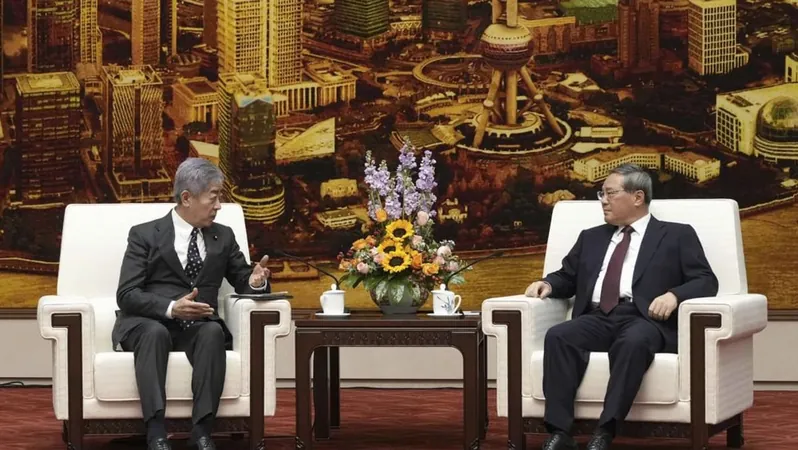
Trump’s Return: Will China Seize the Opportunity to Strengthen Ties with U.S. Allies?
2025-01-22
Author: Sarah
BEIJING: As Donald Trump returns to the White House, U.S.-China relations hang in the balance, with potential for significant shifts as Beijing's ties with countries previously courted by former President Joe Biden improve.
Japan, Australia, and India, part of the Quad coalition, have seen a thaw in their relationship with China, raising questions about the durability of Biden’s approach to countering Chinese influence worldwide.
Experts suggest that Trump’s more unilateral style may present a strategic chance for China. "There’s potential for Trump to prioritize his agenda over traditional alliances, which could inadvertently open space for China's diplomacy," suggested Wu Xinbo, a leading international studies expert in Shanghai. “We need to seize this opportunity,” he added, hinting at a potential pivot in China’s foreign relations strategy.
While Biden’s tenure brought about initiatives like the Free and Open Indo-Pacific strategy, which aimed to curtail China's rising power, Trump's administration has been noted for efforts that could rally global support against Beijing. With strategic discussions already underway, Secretary of State Marco Rubio quickly arranged meetings with Quad partners, indicating that U.S. engagement in the region will remain a high priority.
The Diplomatic Dance: China’s Strategic Outreach
China's attempts at mending ties with the United Kingdom and Japan are just beginning, but challenges abound. For instance, tensions persist over border disputes with India, where ongoing skirmishes complicate any potential rapprochement.
Despite these tensions, countries like the UK, Australia, and India are showing increased interest in rebuilding relationships with China, primarily due to the latter's economic power and its critical role as a supplier of strategic minerals. This motivation is further fueled by China's need for foreign investment, especially with the looming threat of tariffs should Trump pursue his protectionist policies anew.
In a recent conversation, Chinese President Xi Jinping emphasized the need for stability in global affairs to strengthen cooperation with European partners. Notably, economic discussions between China and Britain have resumed after a prolonged hiatus, reflecting a willingness on both sides to mend frayed ties.
Bipartisan Concerns in the U.S.
In Washington, there's a growing bipartisan sentiment for the U.S. to maintain an edge in its economic and technological competition with China. During his confirmation, Rubio referred to China as “the most potent and dangerous near-peer adversary” faced by the U.S. As tariffs from the Biden administration stay intact, the prospect of Trump recycling these tactics could heighten tensions.
However, Trump’s controversial remarks regarding potential territorial expansions – including the suggestion of making Canada the 51st state or annexing Greenland – have raised eyebrows among U.S. allies. Some analysts believe this could disrupt U.S. relationships, encouraging countries to explore other diplomatic avenues, potentially leaning towards China.
Sun Yun from the Stimson Center outlined the sentiments among nations seeking a counterbalance, suggesting that while they see China as an option, the U.S. remains a preferable ally despite Trump’s approach.
The Philippines: A Complicated Landscape
However, not all U.S. partners are warming up to China. The Philippines recently raised alarms over Chinese coast guard activities near its waters, prompting discussions among foreign ministers that underscore the need for continued U.S. involvement in regional security.
A Renewed European Engagement?
In Britain, newly-elected Prime Minister Keir Starmer aims to revive ties with China, a stark contrast to the previous administration’s stance, which deemed China as a strategic threat. While Trump’s return could complicate European-China engagements, many leaders, including French President Emmanuel Macron, still see value in maintaining strong partnerships with the U.S.
Ultimately, the outcomes of Trump’s return to power remain unpredictable. With every move drawing multiple nations into a complex web of diplomacy, how China adapts to this evolving landscape could reshape international relations in profound ways.
Stay tuned as we continue to analyze the unfolding geopolitical scenarios that could dramatically shift global alliances!




 Brasil (PT)
Brasil (PT)
 Canada (EN)
Canada (EN)
 Chile (ES)
Chile (ES)
 Česko (CS)
Česko (CS)
 대한민국 (KO)
대한민국 (KO)
 España (ES)
España (ES)
 France (FR)
France (FR)
 Hong Kong (EN)
Hong Kong (EN)
 Italia (IT)
Italia (IT)
 日本 (JA)
日本 (JA)
 Magyarország (HU)
Magyarország (HU)
 Norge (NO)
Norge (NO)
 Polska (PL)
Polska (PL)
 Schweiz (DE)
Schweiz (DE)
 Singapore (EN)
Singapore (EN)
 Sverige (SV)
Sverige (SV)
 Suomi (FI)
Suomi (FI)
 Türkiye (TR)
Türkiye (TR)
 الإمارات العربية المتحدة (AR)
الإمارات العربية المتحدة (AR)